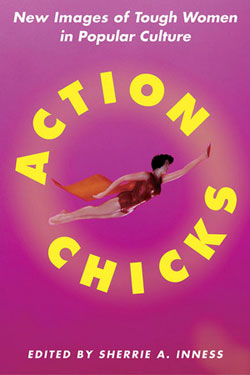Action Chicks: New Images of Tough Women In Popular Culture
By Hervé St-Louis
May 29, 2007 - 09:36
Writer(s): Palgrave Macmillan
Penciller(s): Palgrave Macmillan
ISBN: 1-4039-6396-7
 |
Action Chicks is an anthology about strong action heroines in television, video games, film and comic books in recent times. The main thrust of the book, seen throughout most chapters is that tough action women threaten patriarchy. Although popular characters such as Xena, Buffy, Barb Wire or Dark Angel break standard models established by past heroines, their transgression is somehow excused by pandering to clichés acceptable to men or eventually their career shortened unceremoniously.
Although well researched and fulled of insightful comments, it seems that women, according to the various authors of this book, just can’t win. For example, in Chapter Two, by Jeffrey A. Brown, about bad girls, Barb Wire, who fights against several clichés and patriarchal control, still elicits sexual interests as a feminine dominatrix. Her importance is relegated to those of bad girl characters like Lady Rawhide and Lady Death.
Another chapter on female action figures was captivating because it attempted to prove a point by ignoring available information, mention the missing information near the end of her essay, only to dismiss it. Editor Inness, looks at female action figures, trying to find a 12 inches female G.I. Joe toy in retail stores. However, the type of 12 inches G.I.Joe action figures are not a mass market appeal line. She conveniently ignores the 3 3/4 G.I.Joe series which features few but strong female characters until the end of her argument. She proves her point but ignores entire series of traditional male action figures with female head liners, such as the Danger Girls from MacFarlane Toys.
It seems that none of the women in this book can exist past men and patriarchal society. Few of the essays offer solutions to how to change this, preferring to comment and observe. Reading about familiar characters, such as Chyna through the lens of an anthropologist can be fun though, as subtleties often unseen are unravelled and show that although the situation for action women is better than in the past, there is a lot of room for progress. The only question is whether a strong opposite to patriarchal society must, as seems to be hinted, be fought and vanquished through an equally strong feminist model. Are women truly independent of men, if they must counter men and oppose them at every step, in order to assert themselves?
The other alternative offered several times in this book is that strong action women tend to internalize male features, even become figurative lesbians, in order to be accepted as viable heroines, but ultimately those who are not feminine enough must pay their transgression by failing, and thus, restore patriarchal order.
This book opens up several discussions with views about stuff we all think we know. It’s a good debate starter and offers lots of material to look forward. More concentrated on television and film than video games and comics, it is still very relevant for readers. A better cover would have helped, though.
Related Articles:
The Women of X-Men May Get Their Own Series
Female Characters as Survivors of Rape: Women in Refrigerators or a Necessity in Fiction?
Strawberry Vampire – Malaysian Comics for Women
Women's Month 2007 Round up
Wonder Women: Feminism and Super Heroes
Action Chicks: New Images of Tough Women In Popular Culture
The Women of Comics II Symposium
Making Video Games Desirable for Women
About This Movie: In the Land of Women
Women You Should Get To Know
